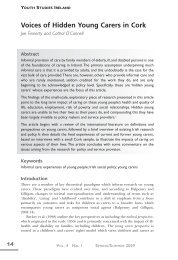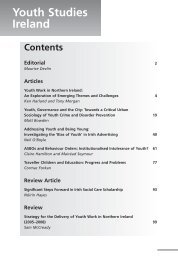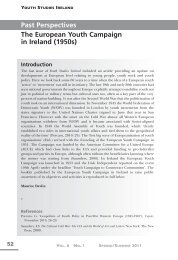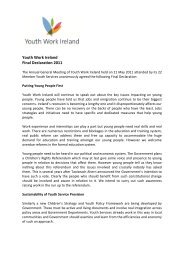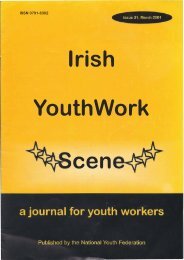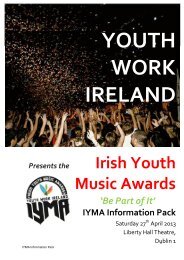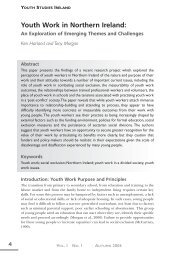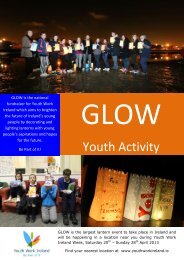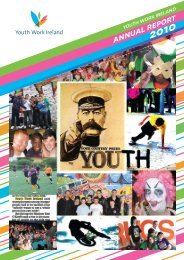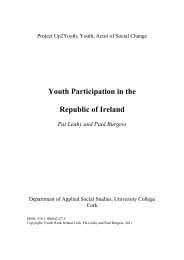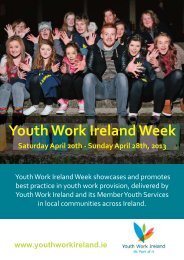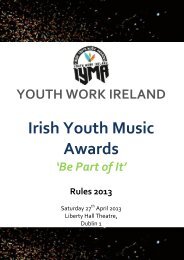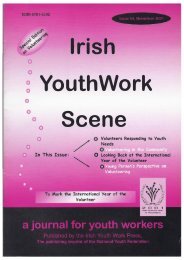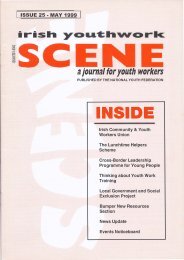Issue 09: March 1994 - Youth Work Ireland
Issue 09: March 1994 - Youth Work Ireland
Issue 09: March 1994 - Youth Work Ireland
Create successful ePaper yourself
Turn your PDF publications into a flip-book with our unique Google optimized e-Paper software.
·········=···············•·i••••••••••l•••••I•···1••• • • 1·····N·•e1···.,···1· ··e···E . .BackgroundM. ···· •· w··· ··:· ··· " . .·: u·· ····· o.·1·· J'j· ·. ·• .. o .... •f = .. s··· ···· 11···· =····· a p .... , ..; o== ;:. · ·. / ::i , \. . '.·;: .1 o; ·}.Liam Kirwan tells Irish <strong>Youth</strong><strong>Work</strong> Scene about theinnovative Community Training <strong>Work</strong>shop in Ennis.This workshop is unique in thatit is a structured attempt at usingmusic as a medium for learning inour Community Training <strong>Work</strong>shopin Ennis. The original idea forthis learning strategy was initiatedby a Danish model and pre-emptedby the fact that a group of ourtrainees spent three weeks (during1993) in a production school inDenmark. While working andtraining in many skills areas theywere also involved in a musicworkshop. They were really excitedand totally dedicated to thisworkshop, which itself was an integraland well established part of theDanish training system. Some ofthese trainees who travelled arevery keen to be involved in thisidea at our workshop in Ennis.In <strong>March</strong> 1993 I visited DanishProduction Schools where I madesome formal contacts with a musicworkshop leader, Lars Hensen inRanders. Lars says "music can bethe best 'tool' for learning, demandinggreat discipline from the youngpeople to aspire to".This visit was part of a Diplomain Practical <strong>Youth</strong> <strong>Work</strong> which I undertookand on which I developedmany useful skills including trainingmanagement, programme designand planning, quality services,co-ordination, resourcing projectsand evaluation. All of this helpedtranslate an idea into a structuredprogramme. In developing theMusic <strong>Work</strong>shop I thought it wouldadd a little more flavour, colour,excitement and offer something differentto our trainees.with some learning difficulties andalso some interest in music. It enhances,enriches and broadens theirlearning experience. It is a new andcreative method for young peopleto express themselves in a way thatwill improve other areas and aspectsof their lives. Because of awide range of personal problemsencountered by these youngtrainees, their need for self-expressionis a 'must' and the mediumof music acts as a catalyst for futurelearning.Task AnalysisThe basic tasks trainees are exposedto include learning music bynote or by number. They gothrough the process of making aninstrument. They learn a beat andlearn about the elements of musicand dynamics that are needed toput a band together. The traineesget an understanding of differentinstruments by seeing, touching,playing, making and even pricingthem. Listening to music of differenttypes is also essential.Theworkshop embraces the whole ideaof experiential learning by doing.Outcomes/ObjectivesThe outcomes of all these ideasare to improve the trainee's approachto learning.Having beenexposed to the many tasks involve .in the music workshop the maiaim would be to improve selfesteem,self-confidence and becomeresponsible for their own decisionsin life.Structure of Music<strong>Work</strong>shopOver the past 8 months theMusic <strong>Work</strong>shop has gone throughvariouschanges for various reasons.Initially we designed and rana six week programme and havingevaluated this, we went ahead andare continuing the programme.This. was mainly due to the enor-BehaviouralThe idea of a music workshopis geared towards young peopleMembers of the Singing Group ECW: Carron Moloney, Kelly-Ann Dobbin, Noreen McNamara,Sharon Pender and Rose Mc GuaneIrish <strong>Youth</strong><strong>Work</strong> Scene . <strong>March</strong> <strong>1994</strong> • page 6
CommentsWhen I came to the Ennis <strong>Youth</strong>Centre first, I didn't believe there was afoundation stone to base on a Music<strong>Work</strong>shop.After the time I have beenhere I have changed my mind.I founda big interest among the young people.It is time to give them the chance to improvetheir own individualities, throughmusic and I hope the time will be givento us to work on this and other programmesin the future.Stefan (Instructor)The Band of '94: Jamie Clune, Peter Nihill, Finbar Sheridan , Kenneth Molloy and Liam Lyonsmously high interest level oftrainees. Because of the continuousintake of trainees to the programmechanges inevitably were made.Greater demands made by thetrainees e.g. a wider variety of instrumentlearning was requested.Also modifications were made becauseof tutor availability. The progranlmehad to be designed arounda shoe-string budget i.e. voluntarytutors, voluntary committee, borrowing/lendingof instruments, poolingof resources including paper,pooling of facilities (rooms to workin) and outside work time for planningmeetings. At one stage we decidedto ask the trainees for 50p perlesson in order to pay for someminor expenses (such as entry to amusic competition).Having gone through manychanges the basic elements to theworkshop include:a) Music <strong>Work</strong>shop SteeringGroup - volunteer musicians whodesign and run the programme andb) The trainees taking part inthe following:• learning to play instrumentsthrough one-to-one and grouptuition• group singingunderstanding music andhistory of same• quality instrument makingincluding piano restorationand creative rhythminstruments are made bytrainees in the wood work,upholstery and metal workprojects• outside musical activities Irish• group music (a band has beenformed and they haveperformed at youth serviceevents)The workshop focuses on learningmusic and making instruments.Trainers have made and used:drum sticks, xylophone, chimes instrument,bongos, triangle, simpleflute, stands and drum stand.Where do we go from here?The programme now needssome new energy put into it, in theform of manpower, facilities, resourcesand limited finance, to promotemore growth in order to leadthis new and innovative piece ofwork into maturity and into the future.I think the greatest thing aboutthe new music programme is thatof the response to it by the youngpeople themselves.This has beenthe biggest 'driver' to the steeringgroup to continue ploughing onand this will be hopefully the drivingforce in the future of the programme.It is an important factor that theyoung people do not have to begood or great musicians to participateand learn something or createsomething.This makes for an attractiveingredient in the programme.The music is just anotherstep, just another key that mayI personally believe music is one ofthe greatest things in life.There is noage limit, no certain background onehas to come from.It is an internationallanguage and everybody is able to dosome of its huge varieties.There isnothing else that can touch you as deepas music in any way.One does notplay music, one lives it!Antje (Music Instructor)I joined the centre in September1992 and have started playing theguitar since <strong>March</strong> 1993. I feel I have adisadvantage in learning because myheavy metal music does not suit theteachers.I practice my music at homeand sometimes in the centre.I likemusic from Metallica and intend to learnopen the door to their learning programme(singing), and myself on keyboard. Iat the Ennis <strong>Youth</strong> Centre(C.T.W.) or at any other educationcentre in <strong>Ireland</strong>.like the music lessons because I think itis a lot of fun.John Sherlock (17 years - trainee)<strong>Youth</strong><strong>Work</strong> Scene<strong>March</strong> <strong>1994</strong> page 7it.But the programme helps for anythingfrom tin-whistle to keyboards anddrums. Also singing is taking a big partin it.A great idea and hopefully manywho work here will appreciate it.I amin a band at the moment in the musicworkshop and we all have picked upwhat we play.We all get on with eachother and it should stay that way.Peter Nihill (16 years - trainee)The partI like most about themusic programme is playing the drums.At the start there was no drum instructor,but now we have a drum instructor.His name is Dave Byrt.I hope to havemore classes with him as I am very interestedin playing the drums.Brendan Coughlan (16 years -trainee)We make our own instruments, egdrums, xylophones, etc. There arenineteen people in the music programme.We also have our own'group/band' which consists of Brendy(drums), Peter, (guitar), Jamie
Charles Handy·F E•'•••.:i!••·lji\R·• •g ;.• . . ...:•:·••: .,::••:.:::·:•·::••:··JO Thank you tor taking the time to speakto the voluntary sector.CH Not at all. I sometimes regret that mybooks seem to end up mainly on the businessshelves when often the themes they areThe future of the <strong>Youth</strong> ServiceCharles Handy's latest book The Empty Raincoat: Making Sense of theFuture (Hutchinson, UK£12.99) - is a wide ranging analysis of changes incontemporary society and stimulating suggestions about how we shouldrespond. When we discovered that one of the suggestions was a new rolefor the youth service, 'Irish <strong>Youth</strong> <strong>Work</strong> Scene' arranged an interview withHandy in the course of a recent visit to Dublin. John Dunne reports.addressing are much wider than that.JO In your latest book "The EmptyRaincoat" you suggest that the youthservice should "take over" where formalschooling leaves oft. What sort of youthservice do you have in mind when you saythis?CH I am thinking in terms of non-formaleducational opportunities provided byvolunteers - in particular those in the "thirdage·, many of whom have greater leisure timethan ever before and a genuine desire to givesomething back to society.JO So what would be the division ofresponsibility between formal educationand the youth service?CH The formal education system is nevergoing to be able to change enough to giveyoung people the skills and experience of lifewhich they will need to equip themselves forthe changing world. I am suggesting thatschool should narrow down and concentrate onwhat it can do best. I would see school asremaining the responsible body for all youngpeople up to the age of 18 but that would notnecessarily mean the young people remainingin school. Instead schools could organise andco-ordinate the development of portfolios byindividual students. They would know wherestudents are and help them to find placementsand opportunities to develop their individualportfolios.JO You say quite flatly that the formaleducation is not going to be able to changeto the extent that society will need it to.CH Yes. Certainly the UK secondary schoolsystem is based upon the objective of passingon knowledge of various types. Education. ismore than this and, in its wider form, is alreadybeginning to by-pass the school system. Weneed to be ready to manage thistransformation. There will be a need to retrainteachers for example. Many might ultimatelybecome involved in a "youth service" but thesystems and institutions themselves will not beable to change enough. I speak in the book ofthe "nouns and verbs" of education. Traditionalschooling has addressed the nouns - reading,writing and arithmetic. Increasingly society willplace a premium on the verbs -conceptualising, coordinating and consolidating- and these are not things which can be taughtin a conventional education system.Photo by Elizabeth HandyJO Your comment in the book that someyoung people might be right to leaveschool early since it is failing them couldbe read as a challenge to governmentpolicy in <strong>Ireland</strong>. Do you think it is realisticin a society with high unemployment toencourage young people to leave schoolwhen they want to?CH I am not saying that. Young peopleshould remain within the education system aslong as possible. The system needs to bemade more flexible to address their needs.Whilst young people might have left the schoolyard before eighteen they would be theresponsibility of the school up to 18. Thereforeduring the time between when they leave formal"schooling• and their 18th birthday they shouldbe engaged in a variety of activities which areregarded as legitimate educationally and whichare regulated and formally counted oraccredited towards their total education.JO This links to another interestingargument in your book • the criticism ofage bonding in education.CH Yes. I use the example of a driving test.If people only had an opportunity to take thedriving test on, say, their nineteenth birthday,we would probably have fewer and betterdrivers on the road. But such a system wouldcause great resentment amongst those whofailed "their one chance". And most peoplewould see that it was an unnecessaryrestriction. One of my children passed herdriving test at seventeen, another at twenty five,but nobody believes that that has any relevanceto the issue of their relative driving skills andbehaviour now.JO You use the idea of paradoxes toexplore aspects of modern society. One ofthese is what you term the paradox ofaging: "every generation perceives itselfas justifiably different from itspredecessor, but plans as if its successorgeneration will be the same as them". Yousay that this time it needs to be different.What are the key changes you would hopeto see?Irish <strong>Youth</strong><strong>Work</strong> Scene <strong>March</strong> <strong>1994</strong>page 8
CH At the time I left school working life beganat the age of 16 or 21 for a privileged few whowere able to afford to continue into third leveleducation. I believe that now serious work willnot begin until age 25 or even 27. Real jobswill simply be too precious to be given toyounger, unqualified people. Accordingly upuntil the age of 27 young people will effectivelybe a population seeking to accumulateprofessional or other qualifications - of whichthey are hungry but that they have no coreto the end of their lives". Could youelaborate on this?CH I don't like the term "unemployed" - Iprefer that of "self-employed". I accept thatthis may look rather semantic but in fact Ibelieve words are very important. Byencouraging people to look for work customersrather than a job I believe it has been maderespectable in England to be self-employed onnot only lifeless and ignorant but are alsoreluctant to offer or to hold any opinions at all.My concern is that we are increasingly living ina society where people refuse to takeresponsibility for their actions, explainingthemselves instead by reference to their statusas victims of "circumstance" and aquasi-scientific determinism.JO So how should society go aboutdefining its moral norms?they will need a lot - in a variety of ways.Because it will be primarily an informationsociety information will have to be accessible toeverybody. Thus there will have to bealternatives to endless post-graduate courses.There will have to be opportunities for youngpeople to add to their portfoliocollection. New forms ofapprenticeship will have to bereated and opportunities will haveo exist for young people to acquirebits and pieces of work in thecontext of a developmentalframework and strategy.Secondly our attitude to educationwill need to change. We will needto enhance our qualifications andlearning right throughout ourworking lives. That is why Isuggest the concept of a doublebond/double voucher system. Thiswould represent a commitmentfrom government which would allowpeople at any stage in their workinglives to take "time out" for personaldevelopment for, say, two years. Itould require financial resourcesbut I would expect the take up to beslow in the initial stage and on thatbasis believe it would befinancable. We need to move awayfrom being a "one chance" society.Intelligence and information is ameans of access to empowerment in thissociety and therefore there is a moral duty toensure that all our citizens have access to it. Inthe past, the assumption was that if you joinedan organisation it would assume responsibilityfor "upgrading you" over your working life. Thisno longer obtains and we need to put somealternative opportunity for lifetime improvementinto place.JO You say in the book that "the problemfor the unemployed is not so much thatthe basis of compiling a "portfolio" of part-timeCH It is very difficult to know exactly howjobs/employments. The enabling of selfmoral standards might be defined. Certainlyrespect in this way is extremely important. Thethe legal system, government and the churchlabel "unemploymenr· is, to my ear, too close toare all relevant institutions in terms of"unemployable''. And also whilst we mustcontributing to the debate. They would all haveensure the opportunity for self-respect amongstsomething to say, presumably different thingsand then individuals could make uptheir minds. The core value that weneed to acknowledge in our societyis that there is such a thing asmorality.Consider where young people learntheir values. In school they simplydeal with their peer group andadults as authority figures. In sucha situation it is not that they notsurprisingly source many of theirmoral values from their peer groupor that pop stars and TV idolsexercise enormous moral influencePhoto by Elizabeth Handythe unemployed we must locate theresponsibility back on them where it has to be.Society's role should be to help theunemployed address their situation but that it isnot the same as saying that it has directresponsibility for changing the situation.JO This would seem to link with yourcriticism of a growing "amorality" incontemporary society.CH I refer in the book to Alan Bloom's "TheClosing of the American Mind" in which heobserves that American college students arebased simply Qn lh
11111111111DEPARTMENT OFEDUCATION NATIONALLOTTERY ALLOCATIONDeputy Gilmore asked the Ministerfor Education the total amount ofmoney made available to her Departmentfrom the proceeds of the nationallottery since 1 January, 1993: and theuses to which this money had been put.In response Minister Bhreathnach suppliedthe estimated expenditure in thisregard in table form (see table 1 ).a) Irish Languageb) Art and CultureTABLE 1<strong>Youth</strong> and SportTotal£million2.15.623.130.1NATIONAL DEVELOPMENTPLAN JOB CREATIONTARGETSDeputy Durkan asked the Ministerfor Enterprise and Employment to whatextent he expected to create jobs tocater for the needs of the 382,000 peopleavailable for work but currently eitherunemployed, on pre-retirement socialemployment schemes or FAS coursesand schemes. In response MinisterQuinn stated that the National DevelopmentPlan <strong>1994</strong>-1999 was expected tocreate about 200,000 jobs in industry,services, natural resource sectors andconstruction and that these jobs wereexpected to translate into a netnon-agricultural job growth of between70,000 and 100,000 depending on thelevel of wage competitiveness improvementand the strength of the growth inthe world economy.CHILD CARE ACT PROVISION FOR YOUNG HOMELESSDeputy O'Donnell asked the Ministerfor Health his response and strategyto deal with the extent of youthhomelessness in the Eastern HealthBoard area as revealed in the EHB's report"Young People out of Home" andto make a statement on the matter inview of his responsibilities under theChild Care Act, 1990. In response MinisterHowlin stated that Section 5 of theChild Care Act, 1991 imposed a statutoryduty on the health boards to provideaccommodation for homelesschildren. As a result of this, extra fundingwas made available to the healthboards in 1991 and 1992 resulting in theprovision of 40 extra hostel and residentialplaces in Dublin and 30 additionalplaces outside Dublin. Hepointed to the annou11cement earlier inthe year by the Government committingthem to implementing the ChildCare Act over a three year period, makingan additional £5 million available tobegin this process. The Minister thenoutlined the following initiatives thathe had approved as part of a packageof new developments for the healthboards;• Additional funding for Focus Poi.nt's "Offthe Streets" project which provides accommodationfor difficult to place youngsters.• Additional funding for Eccles Street hostelto increase their places from 12 to 14.• Funding for a boys' hostel at Botanic Road,Glasnevin.• Funding for accommodation for adolescentgirls at the Salvation Army, EdenQuay.Outside of the Eastern HealthBoard area new service developmentswould include the provision of a grantof £100,000 towards the developmentof Termon Residential Centre forHomeless Girls in Cork and the developmentof a new residential service forhomeless children and abused spousesin Castlebar, Co.Mayo. In conclusionthe Minister stated that the <strong>1994</strong> Estimatesincluded a provision of £15 millionto implement the Child Care Actduring the coming year, that wouldmeet the full year costs of the variousinitiatives launched this year and alsofinance a further round of major newservice developments that wouldamount to £10 million in <strong>1994</strong>.GOVERNMENT PROVISIONFOR THE HOMELESSIrish <strong>Youth</strong><strong>Work</strong> Scene <strong>March</strong> <strong>1994</strong>Deputy M.McDowell asked theMinister for the Environment to outlinewhat steps, if any, he was taking to dealwith homelessness. In response theMinister for State at the Department ofEnvironment Deputy Stagg outlined thefollowing measures being taken by theGovernment in line with the Programmefor a Partnership Government:• The expansion of the local authority buildingprogramme to 3,500 "starts" and thecommitment to a long term house buildingprogramme to benefit the homeless as wellas other categories of persons in need ofhousing;• The capital funding of voluntary bodiesproviding housing accommodation wasincreased from £11 million in 1992 to £12.5million in 1993. As part of this increase anew 107 unit development for homelesspersons being provided by the SalvationArmy at Granby Court, Dublin wouldcome into operation in early <strong>1994</strong>, whiletheir existing hostel at York House hadbeen granted £600,000 to secure its retentionas a hostel for the homeless;• The emergency accommodation being providedby the Army at Lower- Grangegormanwould continue in operation with avoiuntary body taking over the operationof the facility and 90% of the net cost involvedwould be fw1ded by the Departmentof the Environment.• The level of recoupment to local authoritiesfor expenditure incurred by themunder section 10 of the Housing Act 1988on accommodating homeless persons hadbeen increased from 80% to 90% and theprovision to meet this recoupment by theGovernment had been increased from£67 4,000 in 1992 to £1 million in 1993;• An extended referral service for homelesspersons in the Dublin area seeking accommodationoutside the normal openinghours of the EHB's Homeless Persons Unithad recently been introduced. A freephoneservice was now available up to 1.00 a.m.from Monday to Fridays and from 10.00a.m. to 1.00 a.m. on Saturdays and Sun-days, with 90% of the cost of the service tobe funded by the Government.page 12
Put your fi nger on the PULSETwenty five young people travelled to Galway recently for the third phase ofthe new NYF peer education training programme 'Feel the PULSE'.The programmeis based on the development education activity resource manualPULSE, produced by the Fed.The principle aim of the programme is to prepare participants to work withother young people in their club or group in promoting awareness of developmentissues and in planning projects.It is anticipated that young people who havecompleted the training will, in th e long term, support other clubs in their region toundertake projects.'Feel the PULSE' covers a range of issues including images and ideas aboutpeople and the world, food and the environment, discri mination and poverty. Thetraining modules are activity-based and a high level of participation is required.The programme has been designed and facilitated by Tom Larken, a developmenteducation consultant and Ken Keogh, NYF staff.Reaction from the you ng people participating in the programme (from Ke rry,Clare, umencl\, Donegal and Casllel and Emly) llas been very positive and theNYF plans to organise a second programme between September and December.Trocaire 24-Hour Fast for the Third WorldTrocaire have passed on themessage that last year's 24-HourLenten Fast was a great success. Itraised £40,000 which was used tohelp feed, clothe and hou se someof the world's poorest people.This money also went towardsthe continuation of long-term developmentprojects such as the onewhich Trocaire operates in the provinceof Gedo in South-WestSomalia.The programme involvesthe reconstruction of health, ag riculture and irragation in the surrou ndingvillages.This is just one example of whobenefits from the money you raise.There are many other programmesin operation all over the third worldincluding Nigeria and Bolivia.same.This years challenge is theGive one day for the ThirdWo rld. You cou ld organise a24-hour hour fast in your club or youmight consider something alittledifferent such as a sponsored silence.The choice is yours.Try your local youth informationcentre for details or write to:Trocaire,169 Booterstown Avenue,Blackrock,Co. DublinI V A\1[211 IElf>VIH()l\V' '14-Moving statues, a creative dramasketch on a young man with AIDS,singers, dancers and musicians all participatedin what was the first final ofVariety Show - the new National <strong>Youth</strong>Federation national ta lent competition.This was the first year that VarietyShow was organised on a national leveland the high standard and number ofentries ensured that this competition ishere to stay.Well known RTE personality andChairperson of Bord na Gaeilge, MichealO'Muircheartaigh, commendedthe many youth clubs and groups thatparticipated in the various regional finalsand the national semi finals earlierthis year.It was a double success on thenight for Ferns <strong>Youth</strong> Club flautist CatherineMcDonald, who won the SoloInstrumental section and later joinedher club colleagues to scoop the GroupInstrumental award.Aine Cronin of Moyvane in Kerrywon the Best lrish Language Act (Bordna Gaeilge Trophy) while Jackie O'Mahonytook the Best Originaf ftem for h isDrama composition for Tore <strong>Youth</strong>Club.were:The Variety Show '94 winners• Group Singing - Ballyduff <strong>Youth</strong>Club, Kerry• Drama - Tore <strong>Youth</strong> Club, Kerry• Solo Singing - Caherdavin <strong>Youth</strong>Club, Limerick• Dance - Northside Link <strong>Youth</strong> Club,Limerick• Solo Instrumental - Ferns <strong>Youth</strong>Club, Wexfora.• Group Instrumental - Ferns <strong>Youth</strong>Club, Wexford• Comic Sketch - Ba llydesmond <strong>Youth</strong>Club, Kerry• Duais na Gaeilge - Moyvane <strong>Youth</strong>Club, Kerry• Best Original Item - Tore <strong>Youth</strong> Club,Kerry (Drama)ij Irish <strong>Youth</strong><strong>Work</strong> Scene <strong>March</strong> <strong>1994</strong> page 1 3
MEATH YOUTH LEADERS TAKE TO THE HILLSThirty voluntary youth leaders representingeight youth clubs in the Meath <strong>Youth</strong>Federation took part in an exciting weekendtraining programme at Carlingford AdventureCentre, Co. Louth recently. The leadersrepresented clubs from Drumcondrath, Girley,Navan, Dunboyn, Kildalkey, Skryne, Laytownand Bettystown.The training programme included a fivehour treak across the Cooley Mountains whichwas a great ice-breaker or maybe back breaker!!<strong>Work</strong>shops during the weekend includeddrugs and alcohol awareness and creative arts.The workshops were geared to train the leadersto reproduce similar type workshops in their owncommunity setting.Overall the weekend was very successfuland leaders were able to return to their clubswith new ideas for programmes.The Berkeley Travel GuidesHave you ever considered a 'back packing'holiday? Well if the idea appeals to youthe new Berkeley Travel Guide Series, producedby students of the University of California,could be essential reading for you. Theyare aimed at the budget traveller who wishes tospend time developing an insight into a countryrather than just following the usual tourist trail.Five new books have just been added tothe series, one of which covers <strong>Ireland</strong> and Britain.The editor, Scott McNeely, visited Dublinrecently to promote them. Irish <strong>Youth</strong><strong>Work</strong>Scene went along to meet him and to find outmore about the series which claims to "showyou cheap ways to live - and live it up - on theroad".While the publications are funded byBerkeley University and Fodors, a publishingcompany which also produces travel guides forthe mainstream market, Scott stressed that theBerkeley Guides are unique in the sense thatthey are researched and written by students forthe student/younger traveller. This factor, hefeels, tailors the information provided specificallyfor this category of traveller.Editorial control is with the students andessentially the enterprise is fully autonomous.Indeed all of the processes involved in thepublications, production, printing and marketingare carried out by the Berkeley research team.To-date it's an arrangement that appears tohave worked well.Scott outlined the method by which thebooks are researched. Each year 50 studentsare recruited. Basic qualities sought from researchersare the ability to write well and tohandle the 'back packer' lifestyle. As the studentbody at Berkeley Campus renects a widerange of cultures and minorities the mix of researchersis, apparently, incredibly diverse.He says the production team prides itselfon the fact that all the books are updated eachyear, unlike some other travel guides. Whileseveral research assignments involve 'breakingnew ground' there is a very definite policy ofproviding up-to-date information to the reader.Students would normally spend six toeight weeks travelling through a country preparingtheir information. The specific brief is totravel not just the highways but also the byways,meet the locals, find out what they do forfu n, where they go to eat, play or just 'hangout'! All of this to be done as cheaply as poss-ible, in keeping with the budget of the student oryoung traveller.The level of information contained in theguides is quite impressive. For example, informationon hostels, their facilities, rates andon low price quality 'eateries' (restaurants, etc.)is really quite detailed.Scott also stressed that researchers ifthey have experienced poor standards in facilities,service or food, should report this. Theguides, to put it mildly, are quite blunt and relateexperiences as they were.And finally, the verdict on <strong>Ireland</strong> for the'back packer'. Well as with other books in theseries this guide may make some rather opinionated· comments around society and culturewith which one may be tempted to take issue,generally however this country is seen as offeringgood quality facilities for the independenttraveller at competitive rates.<strong>Ireland</strong> was the final stage of a whistlestop tour of Europe for Scott McNeely. Aformer Trinity College student he was nostranger to Dublin and was looking forward toseeing some old friends and having some darkIrish refreshments before returning to the sunnybeaches of California.The Berkeley Travel Guides are availablefrom most leading book shops and retail at£9.99 each. The full range of guides in theseries are: Eastern Europe, Mexico, California,Pacific North West and Alaska. New editions:France, Great Britain & <strong>Ireland</strong>, Germany, CentralAmerica and San Francisco.Irish <strong>Youth</strong><strong>Work</strong> Scene <strong>March</strong> <strong>1994</strong>page 14



